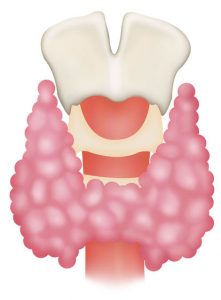 Hives results due to the immune system reacting to a substance that it assumes to be an allergen. Allergies are a type of autoimmune reaction where over production of specific chemicals in the body triggers the immune system in to mistaking the chemicals as allergens. The immune system releases histamines to counter the allergen, which then causes the allergic reaction to stop.
Hives results due to the immune system reacting to a substance that it assumes to be an allergen. Allergies are a type of autoimmune reaction where over production of specific chemicals in the body triggers the immune system in to mistaking the chemicals as allergens. The immune system releases histamines to counter the allergen, which then causes the allergic reaction to stop.
Thyroid conditions are related to hives in around 10% of the total hives cases reported. Increase in the level of antibodies against thyroid cells is seen in people with chronic hives condition. According to a study done on patients with chronic urticaria, it was found that the anti-thyroid antibodies were present in about 27% of the cases studied.
This can result in hives rash.
But intake of adequate amount of thyroid supplements is sufficient to treat the hives and thyroid condition. This applies to situations where the thyroid is euthyroid or functioning normally.
Hives overview
Hives is known in medical terms as urticaria. The hives lesions appear as red or pink welts. You can find them on several parts of the body including your face. The welts are itchy. Their duration varies and can last anytime from as little as few hours or days to weeks or even a few months.
The size of hives ranges from a small pea sized lesion to a plate sized bigger one. Hives occurs in 20% of people worldwide and these individuals have a minimum of one hives incident in their lifetime.
What causes hives?
Viral infections that lead to fever, medications and foods can trigger hives. Exercise, sunlight, vibrations, cold or hot temperature can also cause hives. The hives heals in a few hours or even days but some last for more than 6 weeks too. Such hives are termed as chronic hives or urticaria.
Some of the common food triggers for hives include nuts, fish, peanuts, eggs, dairy products and environmental causes like pollen.
However in most cases of hives, the cause is unknown and such cases are called chronic idiopathic urticaria. And these are mostly of autoimmune nature. A 2013 study done on finding the link between chronic autoimmune urticaria and thyroid autoimmunity revealed that there is equal thyroid autoantibody prevalence in patients with chronic urticaria.
Both conditions result from autoimmune reaction.
A 2017 study on the two conditions reveal that while Hashimoto’s thyroiditis is a condition where the autoimmunity targets a specific organ, in hives the autoimmune reaction is systemic.
Thyroid-hives connection
Thyroid and hives are also related in various other ways too. People with autoimmune thyroiditis tend to have hives along with vitiligo and swollen joints. About 12 % of individuals having chronic urticaria also have a thyroid disease of autoimmune type underlying the hives.
This is usually Hashimoto’s thyroiditis and hypothyroidism.
Whatever be the relation to thyroid, you can prevent taking medications which trigger thyroid or any other internal body organ in order to treat the hives. To enable this, you have to know about the two conditions fully so you can benefit from treating both conditions by just treating the predominant one of the two.
Autoimmunity and hives
Many studies reveal that chronic hives or urticaria is connected with other autoimmune diseases such as Diabetes Type I, Rheumatoid arthritis, Celiac disease, Lupus, Vitiligo, pernicious anemia and Sjogren’s syndrome. As mentioned before there is an increase in anti-thyroid antibodies such as anti-thyrpglobulin and anti-thyroid peroxidase antibodies in people with chronic hives.
Treatment of thyroid condition for getting rid of hives
People who have chronic hives and hypothyroidism will have relief from the hives on being treated for hypothyroidism. A study done on patients with both the condition reveals that those with Hashimoto’s thyroiditis had better hives remission when they were given levothyroxine for a span of eight weeks.
Thus treating the underlying thyroid condition can benefit your hives too.
Although not all cases of chronic hives have underlying hypothyroidism or other thyroid malfunction conditions, the minor percentage of cases that occur respond favorably to thyroid medication. Further there are other hives specific medications that can help such as Antihistamines, Histamine blockers, Leukotriene antagonists, corticosteroids and dapsone.
Key Takeaway
Positive effects are possible in patients with chronic hives and thyroid malfunction when treated with drugs such as Levothyroxine or Armour Thyroid. The levothyroxine helps in minimizing the inflammatory response that causes hives by suppressing TSH.
This helps reduced urticaria symptoms which have to be taken into consideration when treating the small percentage of cases that have both the conditions. And for those with urticaria, it is safe to test for thyroid function and thyroid autoimmunity as the possible connection can help in providing the appropriate treatment for the conditions.
By just treating the thyroid dysfunction it is possible to heal the hives too. This will help in early detection of cases that need treatment of the thyroid dysfunction or in cases where a follow up is required.
No Comments